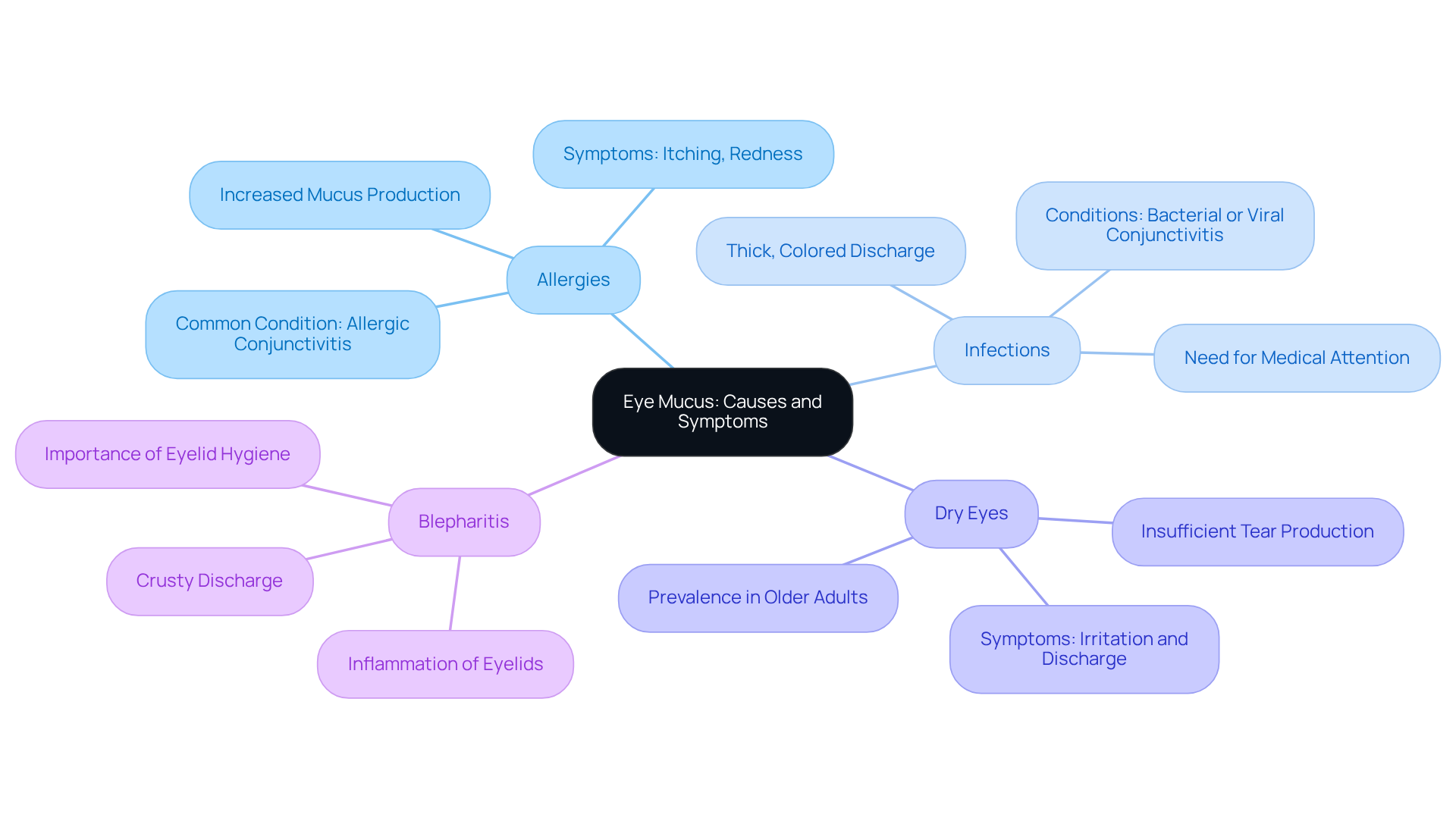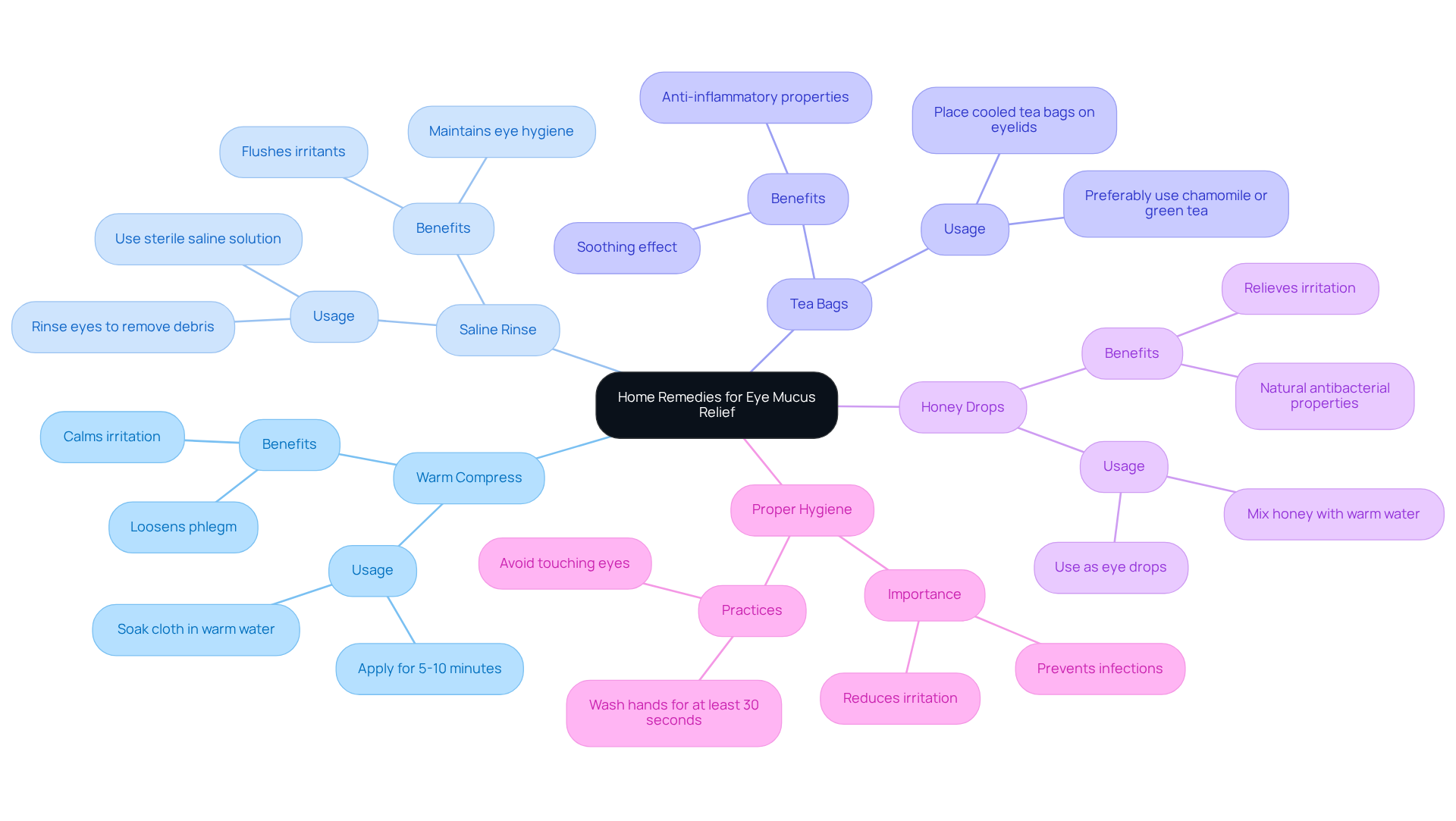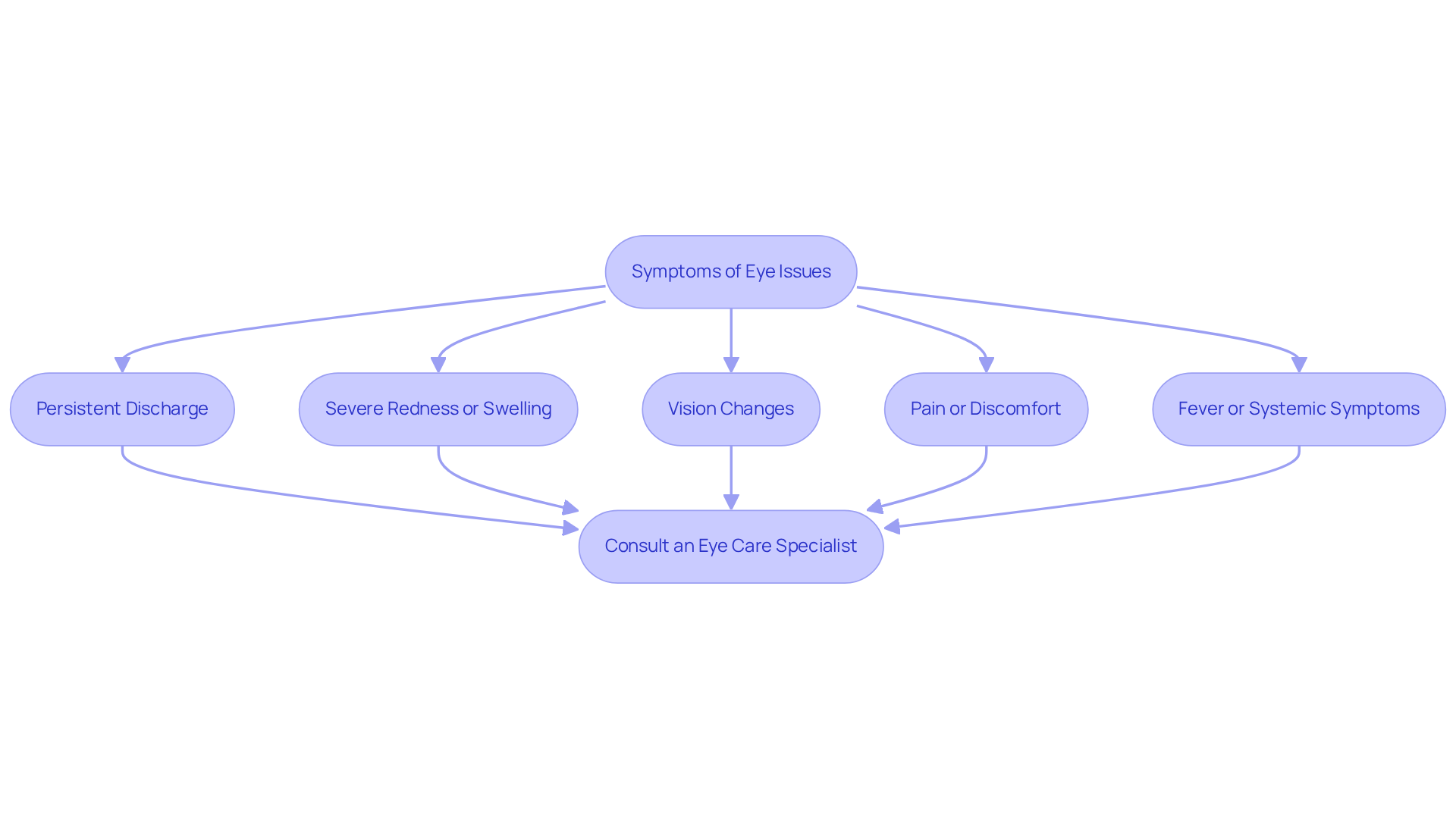Posted by: Northwest Eye in General on July 29, 2025
Overview
To effectively address eye mucus, we understand that home remedies such as:
- Warm compresses
- Saline rinses
- Proper eyelid hygiene
can provide relief from symptoms caused by allergies, infections, or dry eyes. It’s common to feel concerned about these issues, and we want to reassure you that while these remedies can help manage mild cases, persistent or severe symptoms should prompt you to consult with a healthcare professional. This step is important to rule out any serious underlying conditions. Remember, we are here to help you through this process.
Introduction
Eye mucus, often considered a minor annoyance, can actually indicate underlying health issues that deserve attention. We understand that this can be concerning, and knowing the causes—from allergies to infections—can empower you to take control of your eye health.
This article explores effective home remedies and essential tips for managing eye mucus. However, it’s common to wonder what to do when these at-home solutions fall short. Recognizing the signs that indicate a need for professional care is crucial in safeguarding your vision and overall well-being.
Understand Eye Mucus: Causes and Symptoms
, often referred to as ‘eye boogers,’ can manifest in various forms and consistencies, and knowing how to get rid of eye mucus may indicate underlying health issues. We understand that noticing this can be concerning, so let’s explore some key causes together:
- Allergies: Allergic reactions frequently lead to , often accompanied by symptoms such as itching and redness. It’s common to feel overwhelmed, but research shows that is a widespread condition affecting millions, highlighting the prevalence of eye discharge in these reactions.
- Infections: Conditions like conjunctivitis, whether bacterial or viral, can result in , leading to inquiries about how to get rid of eye mucus and signaling the need for medical attention. We want you to know that according to ophthalmologists, is crucial to prevent complications associated with eye infections.
- : Insufficient tear production can cause irritation, leading to a as the eyes attempt to compensate for dryness. This condition is particularly prevalent among older adults, including cataract patients, who may experience increased dryness. We understand how uncomfortable this can be.
- Blepharitis: Inflammation of the eyelids can produce crusty discharge, indicating a need for . Routine cleaning can greatly lessen discomfort and enhance overall eye health, and we encourage you to consider this as part of your care routine.
Symptoms to monitor include:
- Excessive mucus production
- Changes in color (yellow, green, or clear)
- Accompanying symptoms such as redness, swelling, or pain
Being aware of these symptoms is crucial for determining the appropriate treatment and knowing when to seek professional help. We want you to feel empowered in your health journey. Understanding the connection between eye discharge and conditions such as allergies or infections can enable you to take proactive measures in managing your eye health. At , patient education is a priority, and we utilize the latest advancements in eye care technology to ensure optimal outcomes for our patients. Remember, we are here to help you through this process.

Implement Home Remedies for Eye Mucus Relief
To relieve at home, we understand that you may be looking for on how to . Here are some options that can help you feel better:
- : Soak a clean cloth in warm water, wring it out, and gently place it over your closed eyes for 5-10 minutes. This method not only helps loosen phlegm but also calms irritation. Studies suggest that warm compresses can significantly reduce symptoms linked to eye discomfort. Remember to use a fresh compress for each eye to prevent the spread of bacteria.
- Saline Rinse: Rinsing your eyes with a can effectively flush out irritants and reduce mucus buildup. Research shows that saline rinses are beneficial for maintaining eye hygiene and can help prevent infections. It’s advisable to flush your eyes with to remove dirt or debris.
- Tea Bags: Placing cooled, used tea bags (preferably chamomile or green tea) on your eyelids can be soothing. The tannins in tea are known for their , which may help reduce swelling and irritation.
- Honey Drops: For their natural antibacterial properties, mix a drop of pure and use it as eye drops. Ensure that the honey is safe for application on the eyes, as it can provide additional relief from irritation.
- : Regular handwashing for at least 30 seconds and refraining from touching your eyes are essential in preventing illnesses. Gently clean your eyelids with a warm, damp cloth to remove any buildup of discharge.
These remedies can offer considerable relief for those looking for how to get rid of eye mucus. However, if your issues continue or intensify, we encourage you to consult a healthcare professional for further assessment. It’s common to feel concerned, but please remember that viral eye ailments usually clear up on their own within 7-14 days. We are here to help you through this process.

Recognize When to Consult an Eye Care Specialist
While many cases of eye mucus can be managed at home, we understand that knowing how to may not alleviate certain symptoms that could cause concern and indicate the need for professional evaluation.
- Persistent Discharge: If eye mucus continues for more than a few days despite home treatment, it may indicate an underlying issue that requires attention.
- : Intense redness or swelling around the eyes can signal a health issue, necessitating .
- : Any alterations in vision, such as blurriness or double vision, should be assessed immediately, as they may indicate serious conditions.
- Pain or Discomfort: Significant pain or discomfort in the eyes is a clear signal to , as it could be a sign of a more severe problem.
- Fever or Systemic Symptoms: Accompanying symptoms like fever or malaise may indicate a more serious illness that requires urgent care.
Recognizing these . Consulting an , such as those at Northwest Eye, ensures appropriate diagnosis and treatment, particularly for and , which has been linked to various infections and conditions. Remember, timely intervention can prevent complications and safeguard your vision. We are here to help you through this process.

Conclusion
Understanding and managing eye mucus is essential for maintaining optimal eye health. We recognize that dealing with eye discharge can be concerning, and this article has highlighted the various causes, including:
- Allergies
- Infections
- Dry eyes
- Blepharitis
We aim to empower you with effective home remedies and tips for relief, while also emphasizing the importance of recognizing when to seek professional help. Persistent symptoms can indicate underlying health issues that require timely intervention.
Key insights include the importance of proper hygiene and the effectiveness of:
- Warm compresses
- Saline rinses
- Natural remedies like tea bags and honey drops
These strategies can significantly alleviate discomfort and reduce mucus buildup. However, it’s common to feel uncertain about when to consult an eye care specialist. Be vigilant for symptoms such as:
- Persistent discharge
- Severe redness
- Changes in vision
Ultimately, taking proactive steps in managing eye mucus not only enhances comfort but also safeguards overall eye health. Embracing these home remedies and being aware of when to seek professional guidance can lead to better outcomes. We encourage you to prioritize your eye health by incorporating these practices into your routine and consulting a specialist when needed, ensuring that your vision remains clear and healthy.
Frequently Asked Questions
What is eye mucus and why is it a concern?
Eye mucus, often referred to as ‘eye boogers,’ can vary in form and consistency. Its presence may indicate underlying health issues, making it a concern for many individuals.
What are the common causes of eye mucus?
Common causes of eye mucus include allergies, infections (such as conjunctivitis), dry eyes, and blepharitis. Each of these conditions can lead to increased mucus production or discharge.
How do allergies contribute to eye mucus?
Allergic reactions can lead to increased mucus production in the eyes, often accompanied by symptoms like itching and redness. Allergic conjunctivitis is a common condition that affects many people.
What role do infections play in eye mucus?
Infections, particularly bacterial or viral conjunctivitis, can cause thick, colored discharge from the eyes. This often requires medical attention to prevent complications.
How does dry eye syndrome relate to eye mucus?
Dry eye syndrome occurs when there is insufficient tear production, leading to irritation. The eyes may produce more mucus as a compensatory response to dryness, which is especially common in older adults.
What is blepharitis and how does it affect eye mucus?
Blepharitis is inflammation of the eyelids that can produce crusty discharge. Maintaining proper eyelid hygiene can help reduce discomfort and improve overall eye health.
What symptoms should I monitor regarding eye mucus?
Symptoms to monitor include excessive mucus production, changes in color (such as yellow, green, or clear), and accompanying symptoms like redness, swelling, or pain.
When should I seek professional help for eye mucus?
Being aware of symptoms and changes in eye discharge is crucial for determining the appropriate treatment. If you experience significant changes or accompanying symptoms, it is advisable to seek professional medical help.






